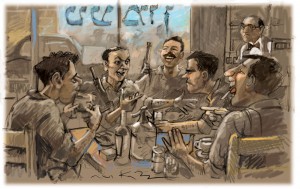The old clock on the café counter inside ticked at least five times before the men began to laugh. At first it was just Nissim, whose trinket shop was just up the hill on Strauss Street, on the border of Mea Shearim. He guffawed as if he didn’t really want to, as if guffawing were the last thing he should be doing at this moment, when they were about to set out for a battle in which many of them were sure to die. But he couldn’t help himself, and when Shlomo joined in with a real belly laugh, coming straight from his very prominent belly, Nissim felt free to enjoy himself. Then Meir joined in, his thumbs pressing out against the straps of the threadbare paratrooper’s pigeon vest that he had been incongruously issued to carry his ammunition in. Arthur, the lost American with the mustache, banged his rifle against the Ta’amon’s display window so hard that Feibel looked up from his newspaper, wiped his hands on his apron, and shuffled out to yell at them.

illustration by Avi Katz
When the laughter died down and Feibel had gone back to spreading out used teabags to dry, Nissim ventured to ask Pini whether any of it was actually true. Pini shot him a condescending glance and Nissim mumbled, “Well, the stories you hear about Paris!”
Shlomo started laughing again. He shook his head. “That’s real talent,” he chuckled. “It takes real talent to tell a joke like that well. I mean, I can just picture them, the babushka and the rabbi and the convent girl! Where’d you learn to tell a joke that way?”





